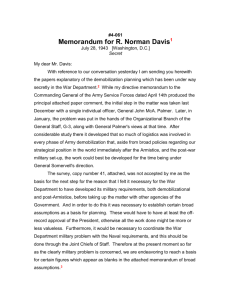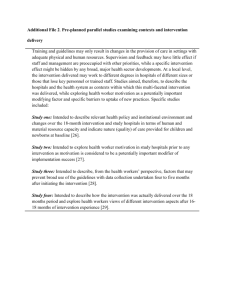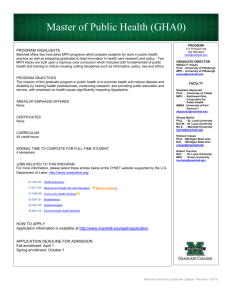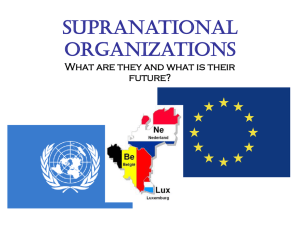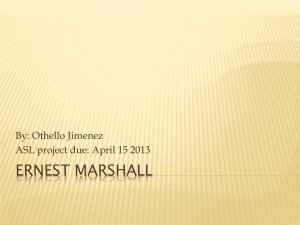4-627
advertisement
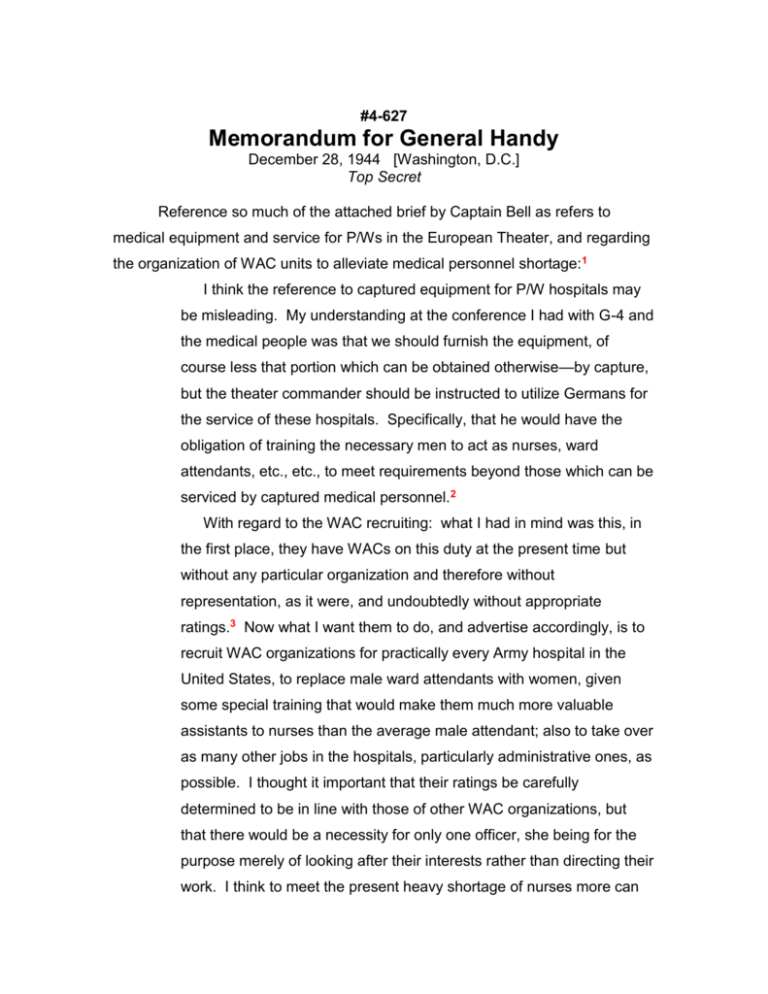
#4-627 Memorandum for General Handy December 28, 1944 [Washington, D.C.] Top Secret Reference so much of the attached brief by Captain Bell as refers to medical equipment and service for P/Ws in the European Theater, and regarding the organization of WAC units to alleviate medical personnel shortage:1 I think the reference to captured equipment for P/W hospitals may be misleading. My understanding at the conference I had with G-4 and the medical people was that we should furnish the equipment, of course less that portion which can be obtained otherwise—by capture, but the theater commander should be instructed to utilize Germans for the service of these hospitals. Specifically, that he would have the obligation of training the necessary men to act as nurses, ward attendants, etc., etc., to meet requirements beyond those which can be serviced by captured medical personnel.2 With regard to the WAC recruiting: what I had in mind was this, in the first place, they have WACs on this duty at the present time but without any particular organization and therefore without representation, as it were, and undoubtedly without appropriate ratings.3 Now what I want them to do, and advertise accordingly, is to recruit WAC organizations for practically every Army hospital in the United States, to replace male ward attendants with women, given some special training that would make them much more valuable assistants to nurses than the average male attendant; also to take over as many other jobs in the hospitals, particularly administrative ones, as possible. I thought it important that their ratings be carefully determined to be in line with those of other WAC organizations, but that there would be a necessity for only one officer, she being for the purpose merely of looking after their interests rather than directing their work. I think to meet the present heavy shortage of nurses more can be done quickly in this manner than by any other method. I also think that it lends itself well to recruiting.4 I am accepting the fact that this will be an increase in our troop strength, which I regard as an unavoidable necessity. Document Copy Text Source: George C. Marshall Papers, Pentagon Office Collection, Selected Materials, George C. Marshall Research Library, Lexington, Virginia. Document Format: Typed memorandum. 1. Concerning Marshall's involvement in European theater hospital and patientevacuation issues, see Marshall Memorandum for General Handy, December 26, 1944, Papers of George Catlett Marshall, #4-624 [4: 711–12]. In his memorandum, Bell had stated that Handy had written to Somervell suggesting that: "a) Maximum use be made of captured medical equipment and personnel to provide medical service for the P/Ws [prisoners of war]. b) Trained Medical Department returnees now ‘Branch Immaterial' be returned to Medical Department for duty and WAC units be organized to alleviate medical personnel shortage." (Bell Memorandum for the Chief of Staff, December 28, 1944, NA/RG 165 [OPD, 632, Case 20].) 2. In the autumn of 1944, the War Department stopped (with few exceptions) the transfer of German prisoner-of-war patients to the United States. By the end of December, this had resulted in the accumulation of fourteen thousand German patients in European theater hospitals. The War Department informed the theater that it would have to care for German patients in hospitals manned primarily by captured German medical personnel. By February 1945, the European theater had in operation or in the process of organization prisoner-of-war hospitals containing thirteen thousand beds. (Smith, Medical Department: Hospitalization and Evacuation, Zone of Interior, pp. 234, 236.) 3. The problems of using Women's Army Corps enlisted personnel in army hospitals had been under discussion for several months. In late September 1944, the Surgeon General's Office had requested that W.A.C. recruiters discontinue the Female Medical Technicians Campaign; in fact, on December 20, the War Department had issued a directive to curtail all W.A.C. recruiting. In December, the problems of W.A.C. members' status in the hospitals had caused Colonel Hobby to protest to Marshall against recruiting W.A.C. personnel for hospital work under prevailing conditions. (Mattie E. Treadwell, The Women's Army Corps, a volume in the United States Army in World War II [Washington: GPO, 1954], pp. 349–52.) 4. For further developments concerning the use of W.A.C. personnel in military hospitals, see Marshall Memorandum for General Handy, January 5, 1945, Papers of George Catlett Marshall, #5-010 [5: 14–15]. Recommended Citation: The Papers of George Catlett Marshall, ed. Larry I. Bland and Sharon Ritenour Stevens (Lexington, Va.: The George C. Marshall Foundation, 1981– ). Electronic version based on The Papers of George Catlett Marshall, vol. 4, “Aggressive and Determined Leadership,” June 1, 1943–December 31, 1944 (Baltimore and London: The Johns Hopkins University Press, 1996), pp. 714–716.
